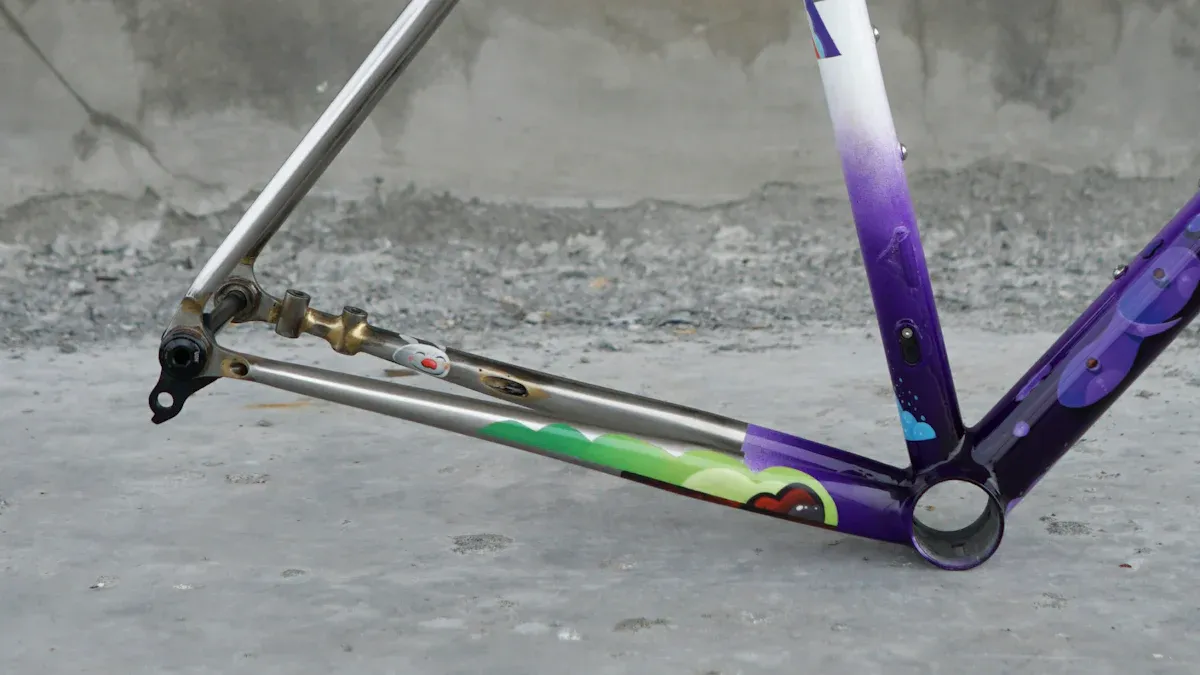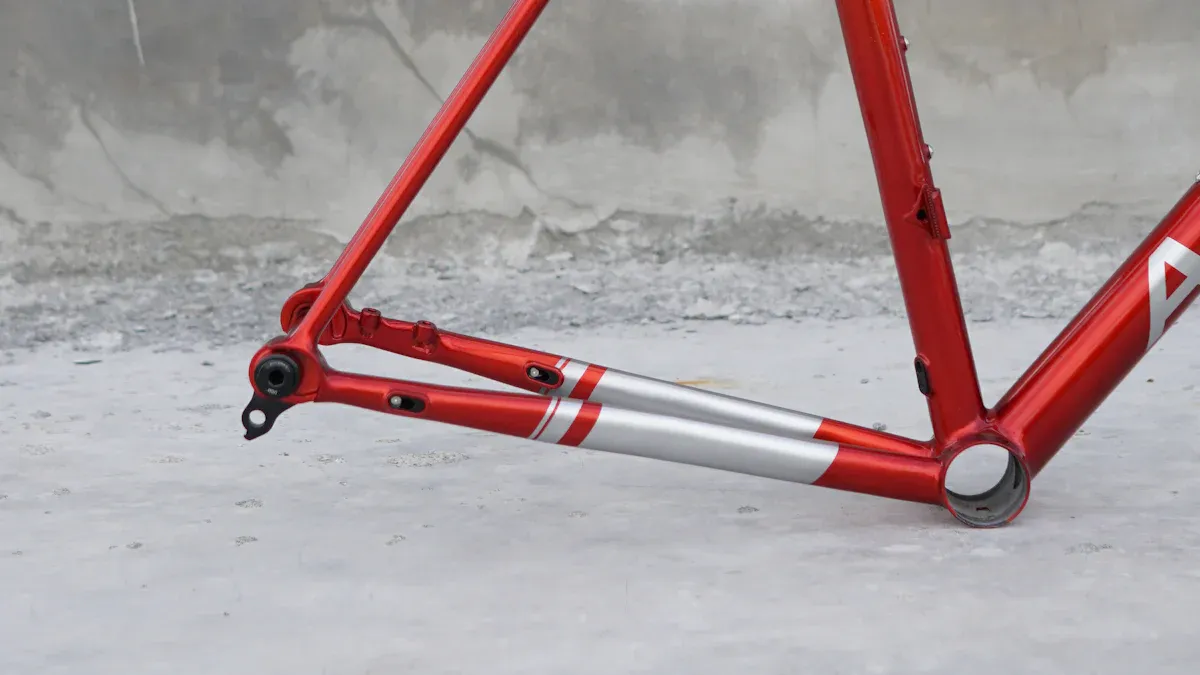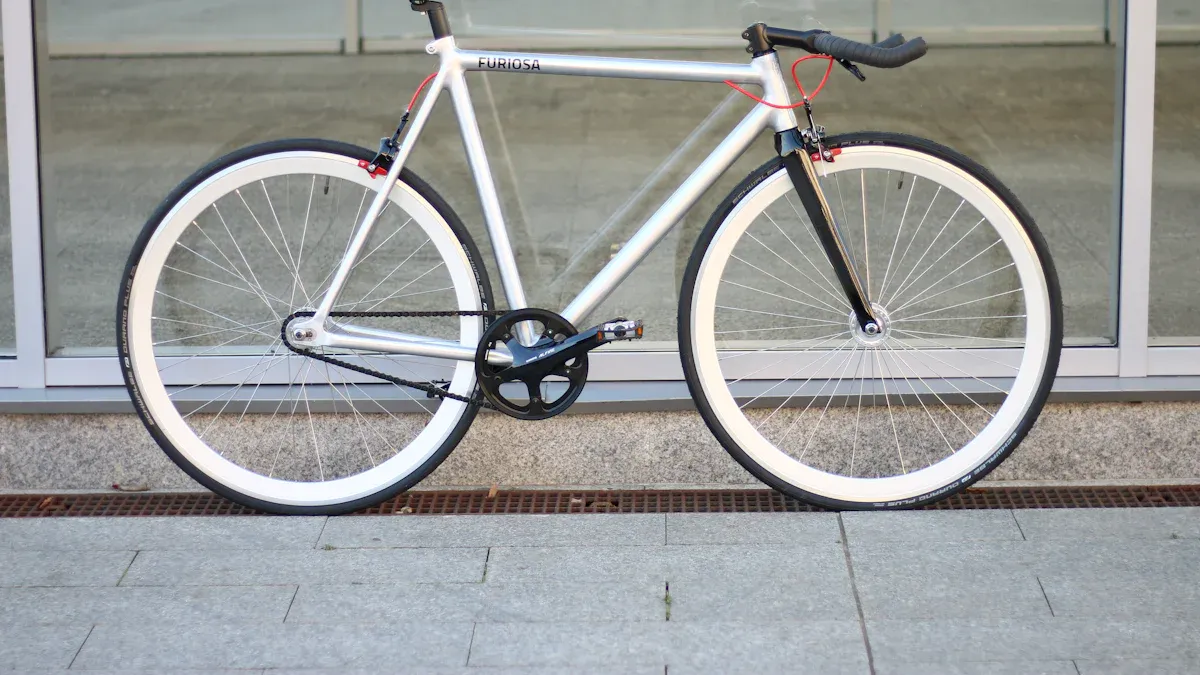
Choosing the right materials for your mountain bike frame design is very important. The frame material directly impacts your bike’s performance, weight, and cost. For example, aluminum frames are affordable and light, making them a popular choice. Carbon fiber frames excel in performance but tend to be more expensive. Steel frames provide strength and comfort, while titanium frames offer long-lasting durability. Lastly, composite materials introduce innovative options that combine various benefits. Understanding these differences is key to selecting the best materials for your mountain bike frame design.
Key Takeaways
Aluminum frames are light and cheap. They are strong too. This makes them a good choice for many riders. They are especially good for beginners and trail riders.
Carbon fiber frames are very good for performance. They are light and stiff. But they need careful handling. They can get damaged in crashes.
Steel frames are strong and give comfortable rides. They are easy to fix. Chromoly steel is a good mix of strength and weight.
Titanium frames last a long time. They do not rust. They are good for riders who want a strong bike. They need less maintenance but cost more.
Composite materials mix the best parts of different materials. Choosing eco-friendly options helps the environment.
ALUMINUM FRAME MATERIALS

Lightweight and Affordable
Aluminum frames are very popular with mountain bikers. They are light and cheap. They weigh between 1400 to 3500 grams. This is much lighter than steel, which weighs between 2200 to 2800 grams. Because they are lighter, you can move your bike easily on tough trails. Aluminum frames are also affordable for all riders. They cost less than carbon fiber and titanium, which are very expensive. Aluminum gives you a good option without losing performance.
Common Applications
You can find aluminum frames on many mountain bikes. This includes trail and enduro bikes. Bikes like the Spectral, Grand Canyon, and Torque use aluminum. It has a great mix of strength, stiffness, and weight. This makes riding easier and needs fewer adjustments. It is also durable, which is good for beginners and experienced riders.
The 6061 alloy of aluminum is popular because it welds well and is strong. It works with different manufacturing methods. This means the frames are light but also tough. This flexibility makes repairs easy, like using steel threads at pivot points. So, aluminum frames are a smart choice for many riders.
CARBON FIBER FRAMES

Performance Benefits
Carbon fiber is a great choice for mountain bike frames. It is very strong and light. This material is better than aluminum and steel in strength-to-weight ratio. Engineers can make carbon fiber bikes super light but still strong. They can shape the tubes in many ways to improve how the bike flexes. This makes riding more enjoyable. Many pro mountain bike racers like carbon fiber frames because they are light and stiff. Studies show that carbon fiber frames are about 20% lighter than aluminum ones. They also reduce vibrations by about 15%. These benefits make carbon fiber the best choice for high-performance mountain bike frames.
Durability Concerns
Carbon fiber has great performance, but it has some durability issues. Carbon fiber frames can last a long time, but they can crack if hit hard, like in crashes. This means you need to be careful with your bike to keep it safe. If a carbon frame gets damaged, it can often be fixed well, bringing back its performance. On the other hand, aluminum frames can wear out over time and may crack, especially near welds. They usually cannot be repaired, so you need to replace them. Steel frames are heavier but very durable and can last for many years of tough riding. In the end, choosing between these materials has trade-offs: carbon fiber is great for strength but needs careful use, while aluminum is less durable but costs less.
STEEL FRAME OPTIONS
Strength and Comfort
Steel frames are very popular with mountain bikers. They are strong and comfortable. Steel has special properties that help with this. For example, steel is very strong. It can handle heavy loads and stress during rides. This strength helps your bike deal with rough trails without losing performance. Also, steel can bend without breaking. This helps absorb shocks and makes riding more comfortable.
Here’s a quick overview of key mechanical properties of steel that make it ideal for mountain bike frames:
Mechanical Property | Description | Contribution to Mountain Bike Frames |
|---|---|---|
Tensile Strength | Ultimate tensile strength of CrMo steel alloy ~560 MPa, about twice that of aluminum alloys | Provides high strength to withstand loads and stresses during riding |
Elongation / Ductility | Steel alloys typically elongate 9-15%, CrMo steel up to 25% | Allows steel to bend plastically before breaking, absorbing shocks and increasing rider comfort |
Fatigue Strength | Steel has a fatigue limit, meaning frames designed below certain load thresholds can last indefinitely | Ensures durability and long-lasting frame life under repeated stresses |
Toughness and Repairability | Steel is tough and easy to repair | Adds to practical durability and reliability of steel frames |
Chromoly vs. Mild Steel
When looking at steel options, you will see chromoly and mild steel. Chromoly steel, like Reynolds 725 and 753, is a special alloy. It has chromium and molybdenum, which makes it stronger and more resistant to wear. This helps builders make lighter frames that are still strong. A chromoly frame can weigh less than 3.5 pounds for a 56 cm frame.
On the other hand, mild steel, also called Hi-Ten 1020, does not have these features. This usually makes frames heavier with thicker tubes, which can lead to a rougher ride. Chromoly frames often use butted and heat-treated tubes. This helps improve comfort by balancing stiffness and flexibility.
Chromoly steel frames usually cost more than mild steel but perform better and last longer.
Mild steel frames are good for beginner bikes, while chromoly frames offer a middle option that balances cost, strength, and comfort.
In the end, if you want comfort and durability in your mountain biking, getting a chromoly steel frame is a smart choice.
TITANIUM FRAME MATERIALS
Durability and Corrosion Resistance
Titanium frames are known for being very strong and lasting a long time. They are tougher than carbon fiber and steel. This makes them great for heavier riders. You can ride on rough trails without worrying about your frame breaking. Unlike steel, titanium does not rust or need paint. This means it is a good choice for people who ride in tough weather.
Titanium has great resistance to rust:
It does not need paint because of its natural qualities.
Aluminum also resists rust, but it can corrode when touching other metals.
Cost vs. Longevity
Buying titanium frames usually costs more money. These frames are often pricier than carbon frames because the materials are expensive and making them takes a lot of work. Still, many riders think this cost is worth it. With good care, titanium frames can last a lifetime, which is why they are called “forever bikes.”
Frame Material | Average Cost | Expected Lifespan |
|---|---|---|
Titanium | $3,000 – $5,000 | |
Carbon Fiber | $2,000 – $4,000 | 4-8 years |
Steel | $1,000 – $2,500 | Lifetime |
Some riders wonder if titanium frames really last longer, but they like how strong and easy to care for they are. While titanium might not last much longer than aluminum in real life, its strength and wear resistance make it a great choice for serious bikers. Many owners see titanium as a long-term buy, backed by lifetime warranties from the makers.
COMPOSITE MATERIALS IN DESIGN
Benefits of Hybrid Materials
Composite materials are very important in mountain bike frame design today. They mix the best features of different materials. This results in frames that are light and strong. For example, carbon fiber is a popular choice. It has a great strength-to-weight ratio. It can be shaped in complex ways to improve performance and comfort. Here’s a quick comparison of common composite materials used in mountain bike frames:
Material Type | Description & Composition | Benefits |
|---|---|---|
Carbon Fiber | Made of graphite fiber cloth layered with epoxy resin; fibers arranged for strength and stiffness | Very strong for its weight; absorbs shocks well; resists corrosion; lasts long; allows unique frame shapes and tuning |
Metal Matrix Composite | Similar to carbon fiber but uses ceramic fibers with aluminum instead of epoxy resin | Combines lightness and stiffness of ceramics with metal strength (less common but similar benefits) |
Aluminum Alloys | Lightweight metal alloy, often from 6000 or 7000 series, treated for strength | Light, stiff (12% stiffer than steel), rustproof, dampens vibrations; affordable; good for suspension bikes |
Titanium Alloys | Alloy of titanium mixed with aluminum and vanadium, resists corrosion and is light | Strong, light, resists rust, good fatigue strength; half the weight of steel; expensive and needs careful welding |
Steel Alloys (Chromoly) | Steel alloy with chromium and molybdenum, strong and stiff but heavier | Strong, flexible ride, easy and cheap to fix, good fatigue strength; heavier than aluminum and composites |
These materials offer many benefits, making them good for different riding styles and preferences.
Sustainability Considerations
Sustainability is becoming more important in mountain bike frame design. Manufacturers have to balance performance with environmental impact. Making carbon fiber uses a lot of energy and relies on petrochemicals. This creates a bigger environmental footprint than aluminum and steel. On the other hand, aluminum production also uses a lot of energy but has high recycling rates. Steel frames have the least environmental impact because they can be recycled easily.
To tackle sustainability issues, manufacturers are looking into new materials and ways to produce them. For example, some companies are using thermoplastic composites. These are recyclable and use less energy to make. Also, new bio-based materials like bamboo and flax fibers provide eco-friendly options. These changes show a move towards more sustainable practices in the industry.
By picking the right composite materials, you can enjoy the benefits of modern mountain bike frame design while also thinking about the environment.
Picking the right frame material is very important for your mountain bike design. Each material has special benefits for different riding styles and terrains. Think about these factors:
Cross-Country (XC): Light carbon frames help you ride faster and climb better.
Enduro: Strong aluminum or titanium frames give you stability on steep descents.
Trail: Flexible aluminum frames mix comfort and control for different conditions.
By matching your choice of mountain bike frame materials with how you ride, you can improve your performance and have more fun on the trails.
FAQ
What is the best material for a mountain bike frame?
The best material depends on how you ride. Carbon fiber gives great performance. Aluminum is cheaper. Titanium is very strong and lasts long. Pick what fits your needs and budget.
How much does a good mountain bike frame cost?
Prices can be very different. Aluminum frames usually cost between $1,000 and $2,500. Carbon fiber frames are priced from $2,000 to $4,000. Titanium frames can cost $3,000 to $5,000.
Are aluminum frames durable?
Yes, aluminum frames are tough and resist rust. But they might not last as long as steel or titanium frames in very rough conditions.
Can I repair a carbon fiber frame?
Yes, you can fix a carbon fiber frame if it gets hurt. Experts can repair it and bring back its performance. Just be careful to avoid cracks.
What are the environmental impacts of frame materials?
Aluminum and steel can be recycled a lot, which helps the environment. Making carbon fiber uses a lot of energy. But companies are looking for better materials to reduce this impact.
See Also
Key Factors To Evaluate When Selecting An E-Mountain Frame
Professional Tips For Picking The Perfect Carbon Bike Frame
Understanding Track Bike Frame Materials And Their Importance
Comparing Enduro Bike Frame Materials For Durability And Strength
